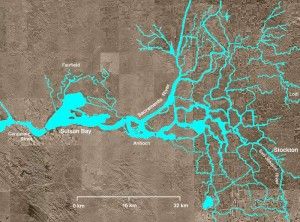Delta Science Remains in Question
A federal judge opened up a can of whoop ass last fall on two government biologists, accusing them of mendacity in making their case for stricter environmental regulations in the Delta.
This week, a report by a supposedly “independent panel of experts” cleared the pair of wrongdoing.
Frederick Feyrer, of the U.S. Bureau of Reclamation, and Jennifer Norris, of the U.S. Fish and Wildlife Service, appeared before U.S. District Judge Oliver Wanger back in September in a legal dispute in which water users in the San Joaquin Valley contended that rules meant to protect the delta smelt, a small minnow-like fish, could be made less onerous without harming the fish.
Judge Wanger put forward a proposed resolution of the dispute — San Luis & Delta-Mendota Water Authority, et al vs. Kenneth Lee Salazar, et al. — that would have struck a reasonable balance between species protection and economic costs to the affected water users. However, Feyrer and Norris would not hear of it, insisting that any relaxation in regulations would place the smelt in imminent danger of extinction.
The federal judge, who has since retired after more than 20 years on the bench, admonished Feyrer for contradicting his own sworn testimony and excoriated Norris as a “zealot.”
In response to Judge Wanger’s scathing criticism, the Fish and Wildlife Service hired Resolve — a Washington, D.C. firm that describes itself as “a neutral, third-party in policy decision-making” — to review the accusations he leveled against the biologists.
Resolve’s President is Steven D’Esposito, who happens to be the former Executive Director of GreenpeaceUSA, the radical environmental group known for its “direction action” against those with which it disagrees. .
D’Esposito’s firm selected scientists Scott McKinley of the University of British Columbia, Bill Pine of the University of Florida and Don Weitkamp of Parametrix, a consulting firm, to conduct the review.
In their report, the trio declared, “We find that in neither case is there evidence suggesting deliberate falsehood, interpolation of personal opinion into science, or other professional misconduct by either Mr. Feyrer or Dr. Norris.” They added, “We do not believe that further investigation would be likely to produce evidence of such misconduct.”
Pleased as Punch
The U.S. Department of Interior, which oversees both the Bureau of Reclamation and Fish and Wildlife, couldn’t have been more pleased with the peer review Resolve ginned up.
“The accusations leveled against our scientists were unfounded,” Interior Department press secretary Adam Fletcher said in a statement, “and these independent findings will clear their names and allow them to continue their important work without distraction.”
But just how “independent” is a review of two biologists employed by Interior Department agencies that was commissioned by one of those agencies (Fish and Wildlife)? What was the likelihood that the reviewers would produce a report that agreed with Judge Wanger’s criticism of the two government biologists?
Judge Wagner was persuaded that the conclusions by biologists Feyrer and Norris — that a relaxation of stringent environmental regulations in the Delta would somehow hasten the extinction of the Delta Smelt — was driven not by sound science, but regulatory zeal.
And no whitewashed review, bought and paid for by the regulatory agency for which one the two biologists works, clears the pair of the damning accusations leveled against them last fall by the federal judge.
— Joseph Perkins
Related Articles
Legislature uses anti-gun laws as diversion
April 3, 2013 By Katy Grimes How convenient. Instead of focusing on criminals released the last two years under AB 109 and
Steinberg rushing arena bill through last days of session
Strange bedfellows are camping out under the bleachers to oppose an arena in Sacramento for the Kings pro basketball team.
The Cost Of Fighting Bullet Trains
FEB. 16, 2011 Sixty-five billion dollars. That’s the newest estimate of how much money it will take to run bullet




